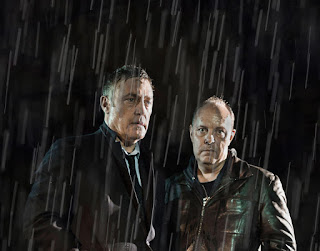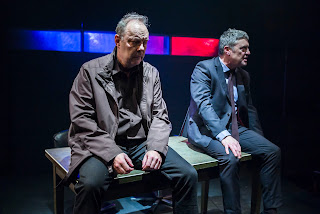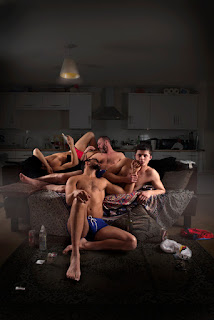It’s fitting that M83 named their seminal 2008 album ‘Saturdays = Youth’. There’s just something youthful about that 80s synth sound – teenagers dreaming of love, life and possibilities; emotional melodrama told through a futuristic filter of space age sounds and beats.
It may seem unfair to bring up M83 in a review of Sweden’s
Postiljonen and their second album, but the comparison is almost inescapable.
That combination of sweeping synth pads, 80s pop hooks, breathless vocals and
saxophone codas applies equally to both bands. It’s also a comparison levelled
at the Swede’s for their debut album, 2013’s ‘Skyer’, and since then their
sound hasn’t radically developed. ‘Reverie’ brings more of the same – both within
the band’s overall output, and within itself.
Yet when Postiljonen are so good at what they do, it’s easy
to forgive – and to forget their influences. ‘Reverie’ may be a glaringly
obvious title to the point of banality, but their music is anything but.
Consistently across the album they deliver lushly textured songs, gently
pulsing, layering vocal harmonies and delicate computerised touches towards
soaring climactic guitar and saxophone lines, repeating lyrics like mantras (Wait’s “if I give my heart away you will
only start a fire”). On Blood Flow,
singer Mia Bøe explores conflicted feelings of love over clashing percussion
and a mournful synth sax line: “you’re the only one who keeps my blood flowing
right, but my heart doesn’t feel like yours”. It's youthful dreaming at its finest.
There is, however, a point of differentiation with
Postiljonen – their Scandi heritage. Bøe is Norwegian, whilst fellow band members
Joel Nostrum Holm and Daniel Sjörs are Swedish, lending an inherent Scandi feel
to their sound. There’s a cold iciness to the synths, the vocals reverbed like
Nordic incantations faintly heard on the breeze of blustery winds blowing over
glacial fjords. There’s a genuine sense of Romanticism to the album, a
loftiness as the band look to the heavens but remain tied to the earthiness of
their home.
And in a modern sense, the band have a predilection for pop
hooks, bouncy rhythms and electronic production that’s so prevalent in
Scandi-pop. Go! features a shouted
hook before lurching into glittery synths and a more upbeat tempo, whilst L.I.E juxtaposes pop production with Bøe
lamenting “lovin’ isn’t easy, I keep finding you in someone else’s arms”. Perhaps
best of all, though, is You’re Ace –
a track that proves it’s not all melancholy. Its buoyant rhythms, choppy
samples and wailing guitars all reflect the joy of the lyrics, Bøe singing “I
wanna waste time with you baby, listen up!” with a cheeky wink.
As its title implies, then, ‘Reverie’ is the perfect album with
which to drift away, to lament, to dream. The influences may be clear, but the
band do just enough to carve out a unique sound that’s undeniably affecting.
4/5
Gizzle’s Choice:
* Go
* Blood Flow
* You’re Ace
Listen: ‘Reverie’ is available now.













